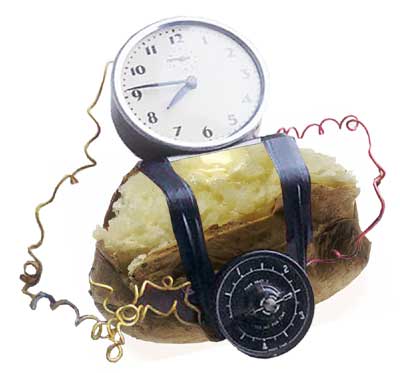 |
After working in the restaurant industry for 20 years, mostly in the kitchen, I have learned much insight about what to eat and what not to eat while dining out. Hopefully the knowledge I’m about to impart will be helpful to you, since most restaurants aren’t readily going to dole out this type of information. Ethics often fall by the wayside when it comes to making the bottom line. On that note, be careful what you ask for–it could make you sick.
1) Beware the Baked Potato
Who would have thunk that something as simple as a baked potato could make you drive the porcelain pick-up truck all night? Yes, it’s true. The ubiquitous baked spud, common at so many steakhouses and family-style restaurants across this great land, is a major offender of food-borne illness. The problem is that once they are fully baked, spuds are often held for several hours in steam tables (or in ovens set on low), causing the tubers to dip into a dangerous temperature zone–between 40 degrees and 140 degrees Fahrenheit. A baked potato held at 70 degrees for two hours exponentially becomes a bacteria-ridden spud bomb. Good restaurants stagger the cooking times of their bakers to ensure a consistent temperature of at least 140 degrees, which makes for a fresher, fluffier potato.
2) Specials Aren’t So Special
Diners figure when they order a special that it’s actually special–possibly some great foodstuff brought in fresh just to appease adventurous diners such as themselves. Wrong! Most often specials end up on the “fresh sheet” because some chef told his sous chef something like this: “Blow-out that halibut; it’s starting to stink.” To which the sous chef would rinse the slime off the fish with cold water, grill it with garlic butter, and top it with a pronounced pesto. Don’t get me wrong, some restaurants bring in fresh items solely for specials, but those places are not the norm.
3) ‘I’ll Have the Soup du Jour’
Soup du jour is a great gesture in theory, yet it usually corresponds to the days when the walk-in refrigerator gets cleaned out. Stinky shrimp? No problem. Just soak the little camerones in cold water (with lemon juice) and drain them thoroughly. Looks like tomorrow it’s spicy seafood stew. Peppers work great for masking the stench of nearly rotten seafood. And the same story goes for those sweaty mushrooms forgotten in the dank corner. Just rinse them with water, sauté them, and make a cream soup. “Would you care for some nice mushroom soup tonight, sir?” You may want to say no.
4) Bone-In Chicken: The Great Offender
Bone-in chicken, and poultry in general, is problematic because it can truly make diners sick if it’s undercooked; unlike beef and lamb, which can be served at rare temperatures. As a diner, especially in a dimly-lit dining room, where you can’t really see how the meat looks near the bone, you are at the mercy of the kitchen staff to nail that 165-degree mark, the recommended internal temperature for bone-in chicken. Anyone who has ever been sick from undercooked poultry can attest to the nastiness of what comes out of your body–at both ends. So, be careful next time you are craving jerked chicken thighs, or you could be doing the herky-jerky all the way to the toilet.
5) Oysters Can Kill You. But Don’t Worry
Famous food writer M.F.K. Fisher once wrote that diners should be cautious of eating oysters, particularly raw ones, in months that don’t have an ” r” in them. The months of May, June, July, and August, especially in Southern climes, are always warmer, which can make for a perfect storm of potential toxins and harmful bacteria. Plus, bivalves tend to spawn during those months, meaning the meat becomes loose and milky. (The latter is not generally a harmful thing; it’s just a textural thing.) The worst case scenario if you do get a hold of a bad oyster is that you could die from Paralytic Shellfish Poisoning (PSP). Don’t worry, though, that oyster shooter is probably safe.
We always want to be transparent and honest about our article content. From time to time, we may link to products and services that compensate us for the referral. This does not affect your cost, but it does help us fund future content for this site.
